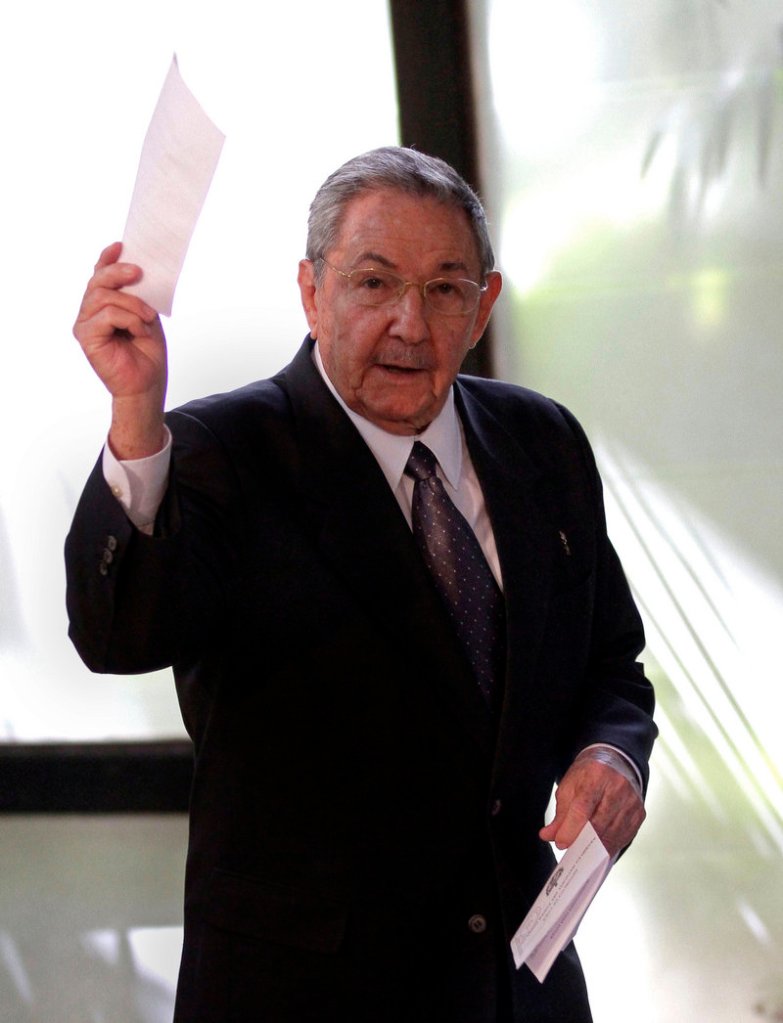HAVANA – Raul Castro announced Sunday that he will step down as Cuba’s president in 2018 after a final five-year term, for the first time putting a date on the end of the Castro era. He tapped rising star Miguel Diaz-Canel as his top lieutenant and first in the line of succession.
The 81-year-old Castro also said he hopes to establish two-term limits and age caps for political offices including the presidency — an astonishing prospect for a nation led either by Castro or his older brother Fidel since the 1959 revolution.
The 52-year-old Diaz-Canel is now a heartbeat from the presidency and has risen higher than any other Cuban official who didn’t directly participate in the heady days of the revolution.
“This will be my last term,” Castro said. In his 35-minute speech, he hinted at other changes to the constitution, some so dramatic that they will have to be ratified by the Cuban people in a referendum.
Still, he scotched any idea that the country would soon abandon socialism, saying he had not assumed the presidency in order to destroy Cuba’s system.
“I was not chosen to be president to restore capitalism to Cuba,” he said. “I was elected to defend, maintain and continue to perfect socialism, not destroy it.”
Castro fueled interest in Sunday’s legislative gathering after mentioning Friday his possible retirement and suggesting lightheartedly that he had plans to resign at some point.
It’s now clear that he was dead serious when he promised that Sunday’s speech would have fireworks, and would touch on his future in leadership.
Cuba is at a moment of “historic transcendence,” Castro told lawmakers in speaking of his decision to name Diaz-Canel to the No. 2 job, replacing the 81-year-old Jose Ramon Machado Ventura, who fought with the Castros in the Sierra Maestra.
Castro said that Diaz-Canel’s promotion “represents a definitive step in the configuration of the future leadership of the nation through the gradual and orderly transfer of key roles to new generations.”
Since taking over from Fidel in 2006, Castro has instituted a slate of important economic and social changes, expanding private enterprise, legalizing a real estate market and relaxing hated travel restrictions.
Still, the country remains ruled by the Communist Party and any opposition to it lacks legal recognition.
Castro has mentioned term limits before, but he’s never said specifically when he would step down, and the concept has yet to be codified into Cuban law.
If he keeps his word, Castro will leave office no later than 2018. Cuban-American exiles in the United States have waited decades for the end of the Castro era, although they will likely be dismayed if it ends on the brothers’ terms.
Nevertheless, the promise of a change at the top could have deep significance for U.S.-Cuba ties. The wording of Washington’s 51-year economic embargo on the island specifies that it cannot be lifted while a Castro is in charge.
Fidel Castro is 86 and retired, and has appeared increasingly frail in recent months. He made a surprise appearance at Sunday’s gathering, receiving a thunderous ovation from lawmakers.
Analysts have speculated that the Castros would push a younger member of their family into a top job, but there was no hint of that Sunday. Rumblings that Diaz-Cane might be in line for a senior post have grown.
Send questions/comments to the editors.



Success. Please wait for the page to reload. If the page does not reload within 5 seconds, please refresh the page.
Enter your email and password to access comments.
Hi, to comment on stories you must . This profile is in addition to your subscription and website login.
Already have a commenting profile? .
Invalid username/password.
Please check your email to confirm and complete your registration.
Only subscribers are eligible to post comments. Please subscribe or login first for digital access. Here’s why.
Use the form below to reset your password. When you've submitted your account email, we will send an email with a reset code.